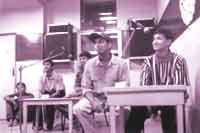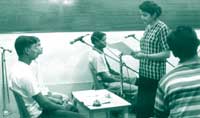| 1 |
What are the modes of transmission? |
| 2 |
What are the symptoms of
HIV? How can one tell if one is infected? |
| 3 |
How/ where does one test
for HIV? |
| 4 |
Is there no cure? |
| 5 |
What is the treatment for
HIV/AIDS? |
| 6 |
How can one find out if a
prospective marriage partner is infected with HIV? |
| 7 |
What is the risk of infection
if I have had a sexual relationship with commercial sex workers/ other
partners? |
| 8 |
Is it possible to be infected
with HIV through razors, syringes? |
| 9 |
Can one get infected by sharing
towels or food? |
| 10 |
Can one get infected through
mosquito bites? |
| 11 |
What are the symptoms of
STD? |
| 12 |
How are STDs treated? |
| 13 |
How reliable are condoms
against HIV/STDs? |
| 14 |
What is the correct way to
use a condom? |


